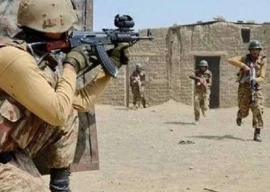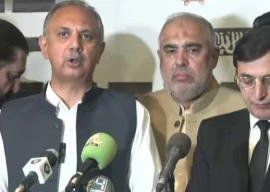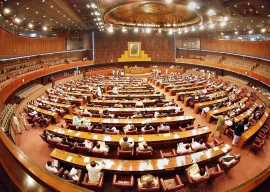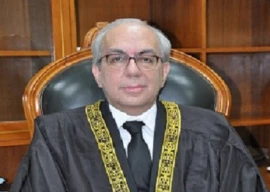1724268870-0/Supreme-Court-of-Pakistan-(2)1724268870-0.jpg)
Tensions flared in the Supreme Court during a hearing on the interpretation of Article 63A, when a lawyer representing Pakistan Tehreek-e-Insaf (PTI) threatened the five-member larger bench.
The incident occurred when PTI’s counsel, Tayyab Mustafain Kazmi, told the court that 500 PTI lawyers were standing outside, ready to prevent any ruling against the party.
Chief Justice Qazi Faez Isa, presiding over the bench, swiftly responded by calling for police to maintain order.
He firmly rejected the attempt to intimidate the court, stating, “Do you want institutions to be run through threats? My only fault is that I have always shown patience.”
The hearing, which was part of the review petition on the Supreme Court’s interpretation of Article 63A, saw heightened emotions as Kazmi criticised the bench's legality and issued strong remarks against the judiciary.
Chief Justice Isa remained resolute despite his warnings, asserting that the court would not tolerate threats or disrespect.
“You cannot run the courts through intimidation. We will continue with the proceedings, no matter how much opposition we face,” the Chief Justice added, signalling that the judiciary would uphold its independence.
Justice Jamal Khan Mandokhail, also part of the bench, expressed concern over the growing trend of targeting judges when decisions do not favour specific parties.
“This behaviour is unacceptable. We are here for the integrity of the institution, not for money or power. The judiciary must remain independent,” he said.
Kazmi's outburst led to a temporary adjournment, and he eventually left the courtroom, refusing to continue his arguments.
Chief Justice Isa, in response, remarked that such incidents only undermine the judiciary’s role and expressed disappointment in the disrespect shown towards the bench.
The five-member bench, which includes Justices Amin-ud-Din Khan, Jamal Khan Mandokhail, Naeem Akhtar Afghan, and Mazhar Alam Miankhel, continued to hear the case after the disruption.
The Article 63A review petition, filed by PTI, questions lawmakers' disqualification for defying party directives during voting.
The case has drawn significant attention due to its implications for party discipline and political dynamics in Pakistan.


1730752226-0/Untitled-design-(35)1730752226-0-165x106.webp)







1726140338-01730723472-0/Untitled-design-(42)1726140338-01730723472-0-270x192.webp)


1724268870-0/Supreme-Court-of-Pakistan-(2)1724268870-0-270x192.webp)




1730706072-0/Copy-of-Untitled-(2)1730706072-0-270x192.webp)
COMMENTS
Comments are moderated and generally will be posted if they are on-topic and not abusive.
For more information, please see our Comments FAQ